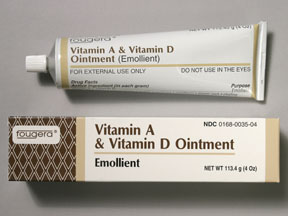
Vitamins A & D Coupons & Savings Card – Discount Prices from $2.27
Generic for: Ra cod liver oil, Yl natural vitamin a & d, A+d prevent
This medication is used as a moisturizer to treat or prevent dry, rough, scaly, itchy skin and minor skin irritations (such as diaper rash, skin burns from radiation therapy). Emollients are substances that soften and moisturize the skin and decrease itching and flaking. Some products (such as zinc oxide, white petrolatum) are used mostly to protect the skin against irritation (such as from wetness). Dry skin is caused by a loss of water in the upper layer of the skin. Emollients/moisturizers work by forming an oily layer on the top of the skin that traps water in the skin. Petrolatum, lanolin, mineral oil and dimethicone are common emollients. Humectants, including glycerin, lecithin, and propylene glycol, draw water into the outer layer of skin. Many products also have ingredients that soften the horny substance (keratin) that holds the top layer of skin cells together (including urea, alpha hydroxy acids such as lactic/citric/glycolic acid, and allantoin). This helps the dead skin cells fall off, helps the skin keep in more water, and leaves the skin feeling smoother and softer.
Our coupons are free to use. Before paying, show the pharmacist your Vitamins A & D savings card to get your free discount. Use our filters below to edit the prescription box to match your needs. The Vitamins A & D prices will update based on your prescription needs. Above our Vitamins A & D coupons, you can change your location to see pharmacy prices and costs in other areas. We're here to help you buy Vitamins A & D at the lowest price with our prescription discount card.
My prescription
Edit
144 ointments 5GM, Vitamins A & D (1 Box)
Select pharmacy

Walgreens
$2.27
COUPON PRICE
Albertsons
$3.56
COUPON PRICEVitamins A & D savings card
Show this card to your pharmacist
Walgreens
$2.27
BIN
ID
PCN
GRP
019876
LH98F9F508
CHIPPO
LHX
Powered by
This medication is used as a moisturizer to treat or prevent dry, rough, scaly, itchy skin and minor skin irritations (such as diaper rash, skin burns from radiation therapy). Emollients are substances that soften and moisturize the skin and decrease itching and flaking. Some products (such as zinc oxide, white petrolatum) are used mostly to protect the skin against irritation (such as from wetness). Dry skin is caused by a loss of water in the upper layer of the skin. Emollients/moisturizers work by forming an oily layer on the top of the skin that traps water in the skin. Petrolatum, lanolin, mineral oil and dimethicone are common emollients. Humectants, including glycerin, lecithin, and propylene glycol, draw water into the outer layer of skin. Many products also have ingredients that soften the horny substance (keratin) that holds the top layer of skin cells together (including urea, alpha hydroxy acids such as lactic/citric/glycolic acid, and allantoin). This helps the dead skin cells fall off, helps the skin keep in more water, and leaves the skin feeling smoother and softer.
Our coupons are free to use. Before paying, show the pharmacist your Vitamins A & D savings card to get your free discount. Use our filters below to edit the prescription box to match your needs. The Vitamins A & D prices will update based on your prescription needs. Above our Vitamins A & D coupons, you can change your location to see pharmacy prices and costs in other areas. We're here to help you buy Vitamins A & D at the lowest price with our prescription discount card.
